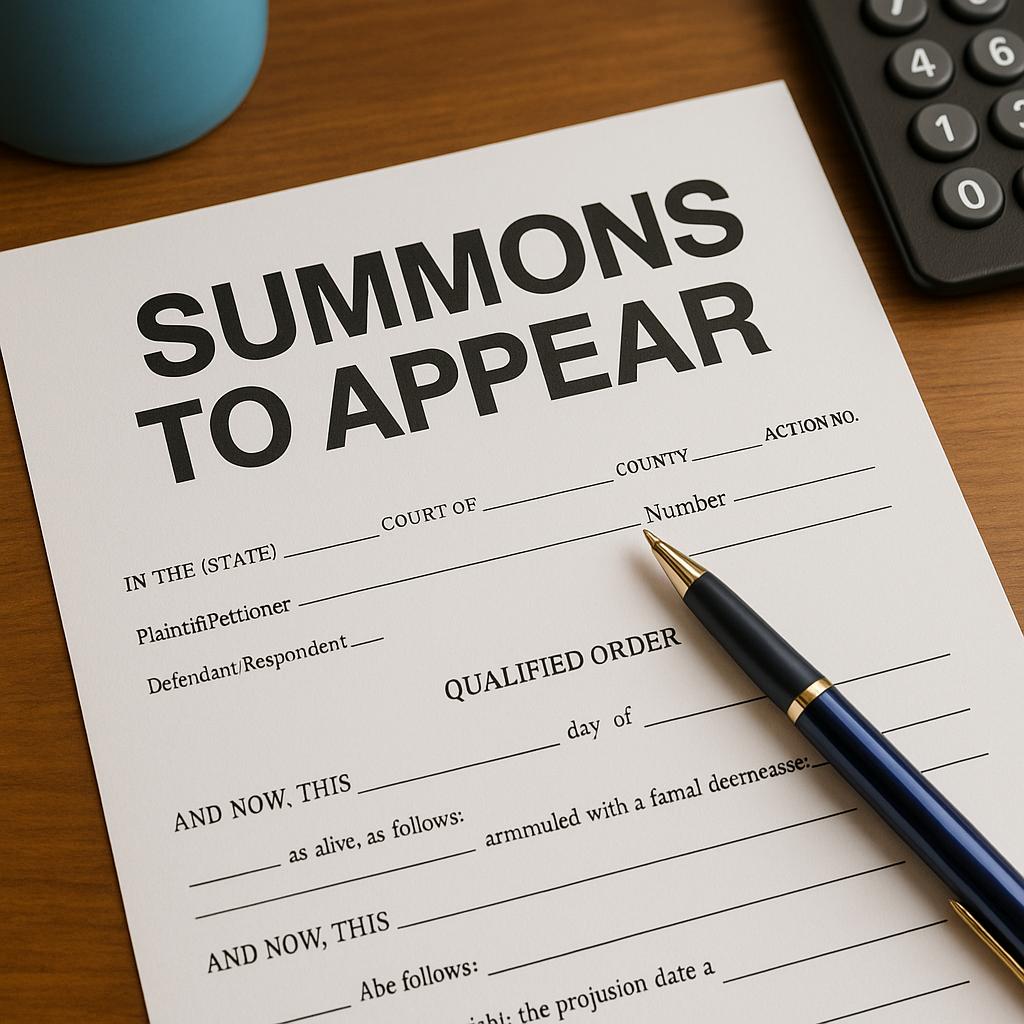 Summons under CPC:- Meaning, Essentials, Types, and Service of Summons
Summons under CPC:- Meaning, Essentials, Types, and Service of Summons
Summons form the foundation of natural justice in civil procedure. Under the Code of Civil Procedure, 1908 (CPC), a defendant must be informed about the legal proceedings filed against him. This intimation, known as a summons, ensures that no person is condemned unheard in line with the principle of audi alteram partem.
If a defendant is not duly served with summons, any decree passed against him will not bind him. Therefore, proper issue and service of summons are crucial in civil proceedings.
∆ Meaning of Summons
When a plaintiff files a suit, the court issues a notice to the defendant informing him:
• That a suit has been filed against him, and
• That he is required to appear before the court to defend himself.
This notice is called a summons. It is not just a formality but a legal requirement to ensure fairness.
Legal Provisions Related to Summons
• Section 27 CPC – Issue of summons within 30 days of filing the suit.
• Section 28 CPC – Service of summons in another State.
• Section 29 CPC – Service of foreign summons in India.
• Section 30 CPC – Powers of the court to issue summons, order documents, or affidavits.
• Section 32 CPC – Consequences of ignoring summons (arrest, property attachment, fine, or civil prison).
Additionally:
• Order 5 CPC – Summons to defendants.
• Order 16 CPC – Summons to witnesses.
✓ Essentials of a Valid Summons (Order 5 Rules 1–2)
1. Must be signed by the Judge or authorised officer.
2. Must bear the seal of the Court.
3. Must be accompanied by a copy of the plaint.
4. Must be in the prescribed form under Appendix B of CPC.
Types of Summons under CPC
Under Order 5 CPC, summons may be issued for different purposes:
1. Summons for Settlement of Issues
• Order 5 Rule 1(1)
• Defendant is called to file a written statement and submit supporting documents.
2. Summons for Final Disposal of Suit
• Order 5 Rule 5
• Defendant must appear prepared with witnesses and evidence for final hearing.
3. Summons for Personal Appearance Only
• Order 5 Rule 3
• Defendant must appear personally if ordered by the Court.
✓ Service of Summons (Order 5 Rules 9–30)
1. Service through Court [Rule 9]
• By court officer, registered post, courier, email, or other communication methods.
• Refusal of summons = deemed valid service.
2. Service by Plaintiff (Dasti Summons) [Rule 9-A]
• Court may allow plaintiff to serve summons personally.
3. Personal/Direct Service [Rules 10–16, 18]
• Served to the defendant, his agent, or adult family member (not servant).
• Must be acknowledged by the recipient.
4. Substituted Service [Rules 17, 19–20]
When defendant avoids service or cannot be located:
• By affixing notice on the outer door of his house.
• By publishing in a local daily newspaper.
• By pasting in a conspicuous place in the court.
• Substituted service = as effective as personal service.
5. Service by Post
• If sent by registered post to the correct address, it is deemed valid even without acknowledgment.
6. Special Situations
• Defendant outside India → Service by post, courier, fax, or email (Order 5 Rule 25).
• Defendant in jail → Summons to be served on the officer in charge of prison (Order 5 Rule 29).
Case Laws on Service of Summons
• State of J & K v. H. W. Mohammed, AIR 1972 SC 2538 – Proper compliance with Order 5 Rule 19 is necessary for valid service.
• Basant Singh v. Roman Catholic Mission, AIR 2002 SC 3557 – Substituted service through widely circulated newspaper is valid even if not the exact paper ordered.
• Sunil Poddar v. Union Bank of India (2008) 2 SCC 326 – Service by advertisement in newspaper is effective even if defendant does not read that newspaper.
• Prabhin Ram Pukhan v. State of Assam, (2015) 3 SCC 605 – Irregularity in summons is not fatal unless substantial prejudice is caused.
Consequences of Non-Appearance after Summons
Under Section 32 CPC, if a person ignores a valid summons, the Court may:
• Issue a warrant of arrest,
• Attach and sell his property,
• Impose a fine up to ₹5,000,
• Demand security for appearance, or
• Commit him to civil prison.
∆ Key Takeaways
• Summons ensure fair hearing and natural justice.
• Must be properly issued and served under CPC rules.
• Various modes of service exist, including personal, postal, electronic, and substituted service.
• Non-compliance with summons can attract serious consequences.
Conclusion
Summons under CPC play a vital role in safeguarding the principles of justice, equity, and fair trial. Without proper service of summons, civil proceedings cannot move forward. Therefore, both litigants and courts must ensure that summons are issued, served, and acknowledged in accordance with law.
✓ To start your preparation for Judicial Services Examination at home, drop a message on WhatsApp +91 8840961324 or call us on +91 9151591324
At Theory of Abrogation, we equip you with everything you need:
•Subject-wise expert classes
•Mock test series
•Legal current affairs
•Personalized mentorship for interview preparation
“Your law degree is your foundation, but your preparation is what will build your success.”
Join Our New Batch Now!
Prepare smart. Prepare with Theory of Abrogation.
Contact Us:
B-109, Commercial
Complex Dr. Mukherjee
Nagar, Delhi-09
+91 9971399324 | +91 8840961324
[email protected]
